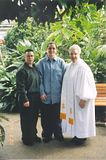SS102: Dialogue: Distorted Perception and Objectivity
SS102: Dialogue: Distorted Perception and Objectivity
It's interesting to look at this after being on my path for a few years. I used to be the judgemental one, quick to point out other people's flaws but hating anyone to see my own. This brought about hatred as a teenager because I seemed perfect. I knew I wasn't, and was frustrated that people thought that, but I couldn't see how I brought that on myself. Another example is my wife's old friends who thought I was trying to be better than them because I didn't talk a lot and didn't do the things they did. I know now I am not better than anyone, and do my best not to make it seem like I feel that way, but back then I don't think I was aware of how I made people feel. So I definately was the type of person who was judgemental.
I'm not so judgemental anymore because it's pointless. However, I hold high standards for people. I used to work at Burger King with a lot of teenagers. They would do so many stupid things, and I would talk to them about life and how they could lead it smarter. At times I would frustrate them because I would work with them to try to think more of themselves and reach for more than their friends and town was showing them. But I truly believe that people can live their lives better and will support anyone who simply tries. I know we fail at this, but it's the act of trying that I value. I hold my high standards but do not criticize for failure. I think this is the only way I can live. Doing anything less than what is in your highest good is going to damage in some way, therefore I try to elevate people towards their highest good.
The hardest lesson I've been learning is how to admit to my own faults. I use stories from my past whenever I can to get a point across. I remind people I work with that I screw up too. I don't like people thinking I'm more than I am, because then it is a lie. It's hard to admit mistakes and faults, and I have a long way to go (for instance simply saying I was wrong is difficult) The great thing about this path is that I will keep trying and in the end I'll be the type of person I want to be. In the meantime I work at forgiving myself for mistakes and shortcomings and continue striving for my ultimate goal as an enlightened human being.
It's interesting to look at this after being on my path for a few years. I used to be the judgemental one, quick to point out other people's flaws but hating anyone to see my own. This brought about hatred as a teenager because I seemed perfect. I knew I wasn't, and was frustrated that people thought that, but I couldn't see how I brought that on myself. Another example is my wife's old friends who thought I was trying to be better than them because I didn't talk a lot and didn't do the things they did. I know now I am not better than anyone, and do my best not to make it seem like I feel that way, but back then I don't think I was aware of how I made people feel. So I definately was the type of person who was judgemental.
I'm not so judgemental anymore because it's pointless. However, I hold high standards for people. I used to work at Burger King with a lot of teenagers. They would do so many stupid things, and I would talk to them about life and how they could lead it smarter. At times I would frustrate them because I would work with them to try to think more of themselves and reach for more than their friends and town was showing them. But I truly believe that people can live their lives better and will support anyone who simply tries. I know we fail at this, but it's the act of trying that I value. I hold my high standards but do not criticize for failure. I think this is the only way I can live. Doing anything less than what is in your highest good is going to damage in some way, therefore I try to elevate people towards their highest good.
The hardest lesson I've been learning is how to admit to my own faults. I use stories from my past whenever I can to get a point across. I remind people I work with that I screw up too. I don't like people thinking I'm more than I am, because then it is a lie. It's hard to admit mistakes and faults, and I have a long way to go (for instance simply saying I was wrong is difficult) The great thing about this path is that I will keep trying and in the end I'll be the type of person I want to be. In the meantime I work at forgiving myself for mistakes and shortcomings and continue striving for my ultimate goal as an enlightened human being.





0 Comments:
Post a Comment
<< Home